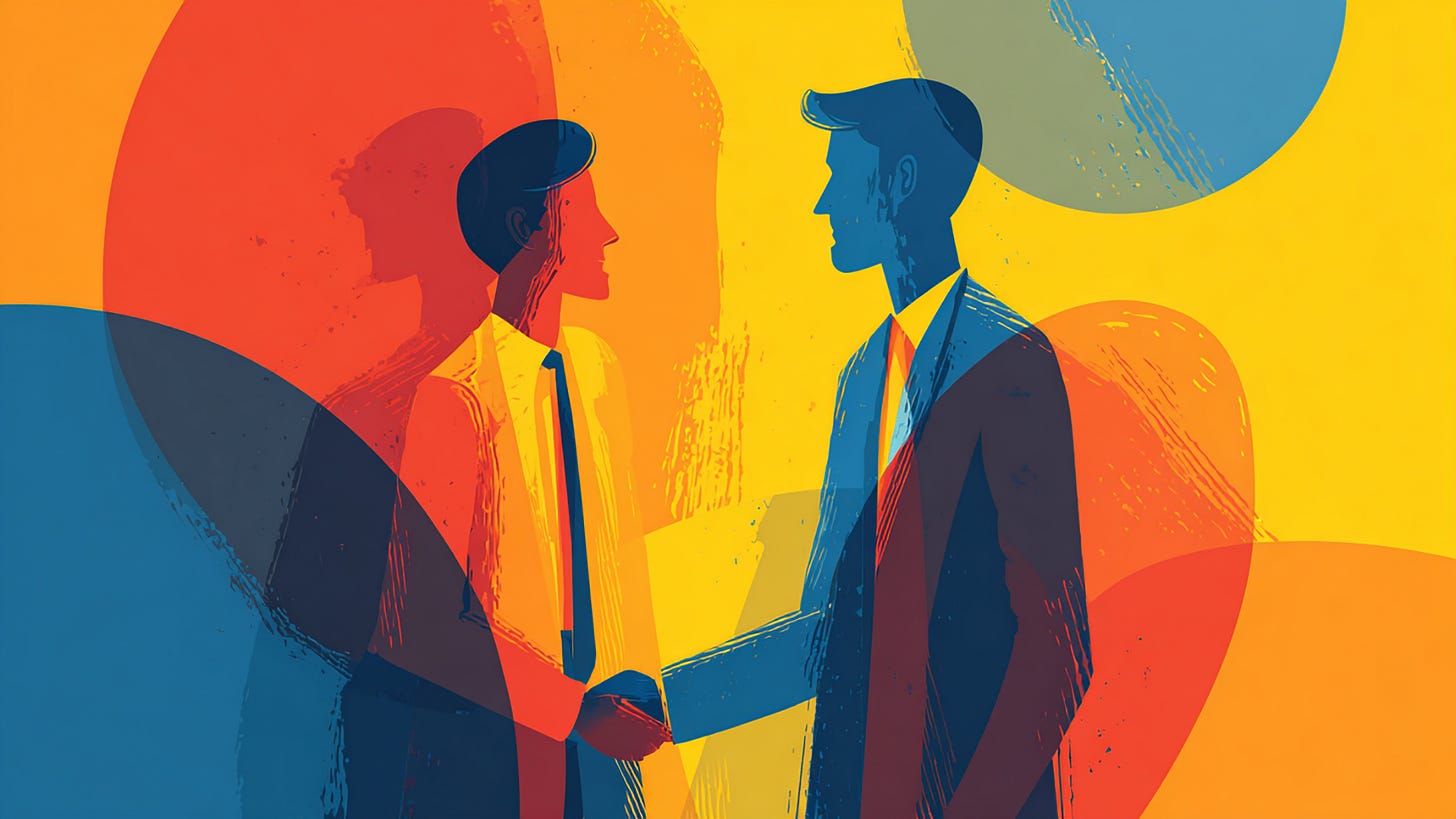The Kindness Trap
When being nice becomes the enemy of doing what’s right.
We’ve all been told to “be kind.” It’s baked into our culture, our classrooms, and our conference rooms. Kindness is the safe move—the default behavior we’re rewarded for in polite society. In business, we extend this to clients, partners, and peers. We reply with pleasantries, accommodate unreasonable deadlines, and stay agreeable even when our instincts tell us otherwise. We call it professionalism, but often it’s something else: fear of friction.
Kindness, in this sense, becomes passive—a performance of peacekeeping. It smooths edges, avoids tension, and keeps relationships comfortable—sometimes at the cost of clarity or truth. We say “no problem” when there is a problem. We agree to revisions that dilute the work. We nod along with strategies we know will fail because we don’t want to seem difficult. The result is a business that feels warm but hollow, and clients who feel heard but not truly helped.
Empathy is different. Where kindness is about comfort, empathy is about connection. Kindness asks, How can I make you feel good right now? Empathy asks, What do you actually need from me—even if it’s uncomfortable? Empathy isn’t the absence of conflict; it’s the understanding that tension can serve progress. It requires curiosity, humility, and the willingness to step into another’s shoes without losing your footing in your own.
In creative or entrepreneurial work, that distinction matters. Clients don’t hire us to be agreeable—they hire us to see what they can’t, to translate goals into outcomes, to protect their brand from bad ideas and soft thinking. If we default to kindness, we risk becoming order takers instead of trusted advisors. Empathy gives us permission to challenge, to reframe, to say no with care and yes with conviction. It’s how we advocate for the work and the client’s long-term success at the same time.
Being kind might win you friends. Being empathetic builds partnerships. The kind leader keeps people comfortable; the empathetic leader keeps them growing. In a world that rewards politeness, it can feel counterintuitive to lean into empathy—to risk discomfort for the sake of truth—but if we’re serious about serving our clients, our teams, and our craft, we owe them more than niceness. We owe them understanding.
That distinction between kindness and empathy isn’t just theoretical—it shows up in how we lead, communicate, and create every day. Few people illustrate that better than Eggs! The Podcast guest and Director of Audio at IMS Technology Services, Chris Leonard. Chris has spent a career making other people heard—from the stage monitors of Tears for Fears to the sound systems of presidential inaugurations. But what makes his story remarkable isn’t the scale of the shows he’s mixed; it’s how he’s learned to listen. In his world, empathy isn’t a buzzword—it’s a survival skill. When you’re mixing sound for artists or managing crews under pressure, being “kind” doesn’t cut it. You have to understand what people need before they say it—and sometimes give them what they need, not what they want.
Turning Volume into Vision
Chris Leonard is the Vice President of Operations at IMS Technology Services, a national production-services firm based in Pennsylvania. He entered the professional audio world following in his father’s footsteps, learning early that sound isn’t just gear—it’s emotion, communication, and connection.
Before shifting into corporate production leadership, Leonard spent years on the road as a monitor engineer for major touring acts, including Tears for Fears, Don Henley, and Josh Groban. His work ranged from large-scale concerts to high-pressure national events, which taught him that the best mix isn’t just audible—it’s aligned with how people feel and what they need.
Today, Leonard draws on that touring mindset in his leadership role: he emphasizes empathy over mere kindness, listening more for what’s unsaid than what’s voiced. As he puts it, knowing how to tune a system is one thing—knowing how to read a room is another. That sensibility informs how he builds teams, collaborates with clients, and elevates production from “nice show” to meaningful experience.
What Sound Can Teach Us About Leadership
When you’re mixing sound for world-class artists or running the tech behind a presidential inauguration, kindness isn’t enough. Success depends on listening beyond the words—reading the tone, body language, and emotion of every person in the room. That’s empathy in practice.
Chris Leonard has built a career out of listening well. From touring with Tears for Fears and Don Henley to leading audio teams at IMS Technology Services, he’s learned that understanding people matters as much as understanding the gear. These are a few insights from our conversation that any entrepreneur, creative, or leader can put to work right now..
“I liked getting into people’s headspace and knowing what it is that they want.”
Insight: True empathy starts with curiosity. Don’t wait for clients or teammates to spell out what they need—study their cues, tone, and energy. You’ll often discover the real problem before they name it.
“When Roland from Tears for Fears would sing a few lines at sound check, I could tell where he was at that day.”
Insight: Emotional awareness is a leadership skill. The people you work with show you how they’re doing—if you know how to observe. Small tells reveal big truths.
“Management is all about empathy. Some people think it’s a weakness. I consider it the most valuable tool you have for managing people.”
Insight: Empathy isn’t softness—it’s strategy. The more you understand people’s motivations, the more effectively you can guide them toward shared goals.
“I like to study people. What I didn’t know early on—but know now—is that it was empathy.”
Insight: You can practice empathy like a craft. Observe behavior, ask better questions, and keep refining your instincts. It’s not an innate trait—it’s a discipline.
“If you can’t relate with them and understand where they’re coming from, you’re never going to be on the same wavelength.”
Insight: Every role that requires collaboration is partly psychological. Learn to hear what people mean, not just what they say.
“I was trying to learn from other tours—how did they get me to do this task? How did they communicate it?”
Insight: Empathetic leaders reverse-engineer good communication. Study what works on you, and replicate it for others.
Built to Endure
Kindness is easy. It’s polite, predictable, and comfortable. But empathy is what moves the needle. It asks us to listen with intent—to the room, to the client, to ourselves—and make choices that serve something deeper than momentary comfort. It’s harder work, but that’s the point. Building a business around empathy forces us to stay present, to challenge assumptions, and to care enough to risk disagreement when the truth demands it.
Chris Leonard’s story is proof that empathy scales. The same instinct that helped him read the subtle tension in a performer’s voice now helps him manage teams, lead clients, and design experiences that resonate. His success doesn’t come from avoiding friction; it comes from understanding it—knowing when to lean in, when to hold back, and when to simply listen.
In a culture that celebrates being nice, empathy is the deeper act of service. It’s the difference between giving people what they want and giving them what they need. As leaders, creators, and entrepreneurs, our job isn’t to make every interaction pleasant—it’s to make every outcome meaningful. That’s what it means to be truly human in business. And that, more than kindness, is what earns lasting trust.
Thanks for reading,
—Ryan
Ready for more?
Catch Chris Leonard’s interview in its entirety on Eggs! The Podcast.
Don’t miss a show! Subscribe on Spotify, Apple Podcasts, or really anywhere great podcasts are found.
Path Picks
Cool stuff to help you forge your path to greatness.
Note: The Path Weekly is reader-supported. As such, I may be using affiliate links below. If you want to support the newsletter at no additional cost to you, please consider using the links below. If you’d rather not, most items below are widely available anywhere you want to shop. Thanks! –R
Reading list
If you're looking to go deeper on the themes from this week's newsletter, here are a few books that pair well with the conversation and offer a broader perspective:
Empathy: Why It Matters, and How to Get It — Roman Krznaric
A modern classic that reframes empathy as a muscle you can strengthen rather than a trait you either have or don’t. Great for entrepreneurs wanting a practical approach.
A clear guide to balancing empathy and directness in leadership—essentially the “say no with care and yes with conviction” philosophy from your essay.
Explores how vulnerability and empathy form the backbone of courageous leadership. Especially good for teams and client-facing creatives.
More to explore
Company Website:
Work with me
Ryan Roghaar - Fractional CMO/Creative Director/Art Director: https://rogha.ar/portfolio
R2 - Creative Services for Agencies and SMBs: https://www.r2mg.com
***NEW*** R2 Health - Healthcare branding & strategy that connects, inspires trust, and drives results. Powered by R2. https://www.r2mghealth.com
Eggs! The Podcast: https://www.eggscast.com
Would you like a personal introduction to any of the incredible leaders featured in The Path Weekly to explore business or other collaborative opportunities?
Contact me here to learn more about my B2B matchmaking service.
Get featured
Do you want to be featured in a future edition of The Path Weekly?
Contact me to learn more.




